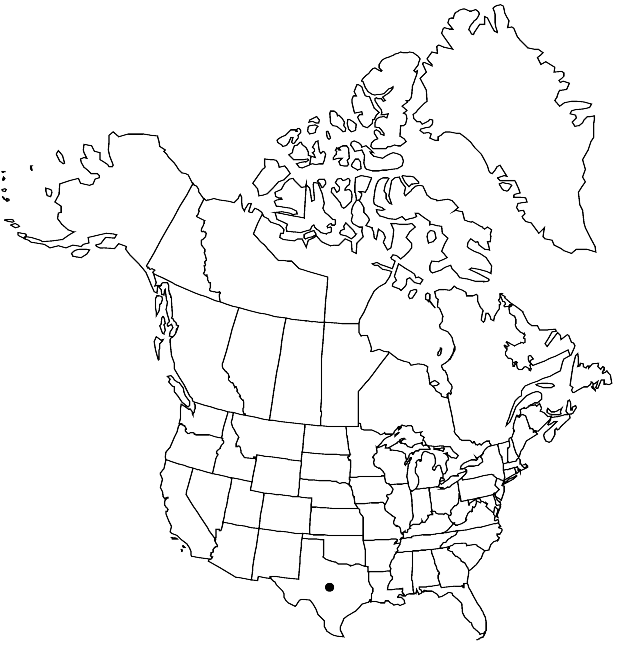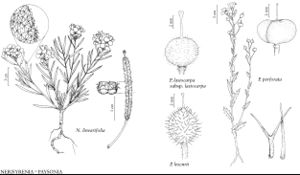Difference between revisions of "Paysonia lasiocarpa"
Novon 12: 381. 2002.
FNA>Volume Importer |
FNA>Volume Importer |
||
| Line 11: | Line 11: | ||
|name=Vesicaria lasiocarpa | |name=Vesicaria lasiocarpa | ||
|authority=Hooker ex A. Gray | |authority=Hooker ex A. Gray | ||
| + | |rank=species | ||
|publication_title=Smithsonian Contr. Knowl. | |publication_title=Smithsonian Contr. Knowl. | ||
|publication_place=5(6): 13. 1853 | |publication_place=5(6): 13. 1853 | ||
| Line 17: | Line 18: | ||
|name=Lesquerella lasiocarpa | |name=Lesquerella lasiocarpa | ||
|authority=(Hooker ex A. Gray) S. Watson | |authority=(Hooker ex A. Gray) S. Watson | ||
| + | |rank=species | ||
}} | }} | ||
|hierarchy=Brassicaceae;Brassicaceae tribe Physarieae;Paysonia;Paysonia lasiocarpa | |hierarchy=Brassicaceae;Brassicaceae tribe Physarieae;Paysonia;Paysonia lasiocarpa | ||
| Line 52: | Line 54: | ||
-->{{#Taxon: | -->{{#Taxon: | ||
name=Paysonia lasiocarpa | name=Paysonia lasiocarpa | ||
| − | |||
|authority=(Hooker ex A. Gray) O’Kane & Al-Shehbaz | |authority=(Hooker ex A. Gray) O’Kane & Al-Shehbaz | ||
|rank=species | |rank=species | ||
| Line 64: | Line 65: | ||
|publication year=2002 | |publication year=2002 | ||
|special status= | |special status= | ||
| − | |source xml=https://jpend@bitbucket.org/aafc-mbb/fna-data-curation.git/src/ | + | |source xml=https://jpend@bitbucket.org/aafc-mbb/fna-data-curation.git/src/f50eec43f223ca0e34566be0b046453a0960e173/coarse_grained_fna_xml/V7/V7_1004.xml |
|tribe=Brassicaceae tribe Physarieae | |tribe=Brassicaceae tribe Physarieae | ||
|genus=Paysonia | |genus=Paysonia | ||
Revision as of 22:11, 16 December 2019
Annuals, biennials, or perennials; pubescent, trichomes branched, or mixed with simple, larger ones. Stems decumbent to procumbent, (slender), 1–5 dm. Basal leaves: blade (oblanceolate), 3–10 cm × 10–30 mm, margins sinuate-dentate to somewhat lobed or incised, surfaces densely pubescent. Cauline leaves: blade obovate-elliptic to oblong, 1–4 cm × 5–20 mm, base cuneate to auriculate (narrowed toward base), margins sinuate-dentate to incised, (surfaces densely pubescent). Fruiting pedicels recurved, slightly curved, 1–3 cm, (racemes lax in fruit), densely pubescent. Flowers: sepals (green), 4–5.5 × 1.5–2 mm, (nearly acuminate), pubescent or hirsute (trichomes branched); petals light yellow (often drying purplish), 5–9 × 4–6 mm, (claw relatively short), apex rounded; filaments not dilated basally, (2.5–3.5 mm, anthers sagittate, 2–3 mm, glands with horn-like projections at base of filaments). Fruits sessile, orbicular, elliptic, or cordate, 5–9 × 4–9 mm, (angustiseptate or slightly so); valves (rounded or strongly keeled), densely pubescent, trichomes branched, sometimes with simple, larger ones; replum oblong to nearly elliptical; septum complete, (transparent); ovules 14–32 per ovary, (attached in proximal 1/2); style 1–1.5 mm; stigma expanded. Seeds suborbicular (slightly longer than broad), 1–2.2 mm.
Distribution

s United States, n Mexico.
Discussion
Subspecies 2 (2 in the flora).
Selected References
None.
Key
| 1 | Annuals; trichomes simple and branched; fruits inflated, valves rounded. | Paysonia lasiocarpa subsp. lasiocarpa |
| 1 | Annuals, biennials, or perennials; trichomes usually simple, sometimes mixed with smaller, branched ones; fruits not inflated, valves somewhat to strongly keeled. | Paysonia lasiocarpa subsp. berlandieri |
